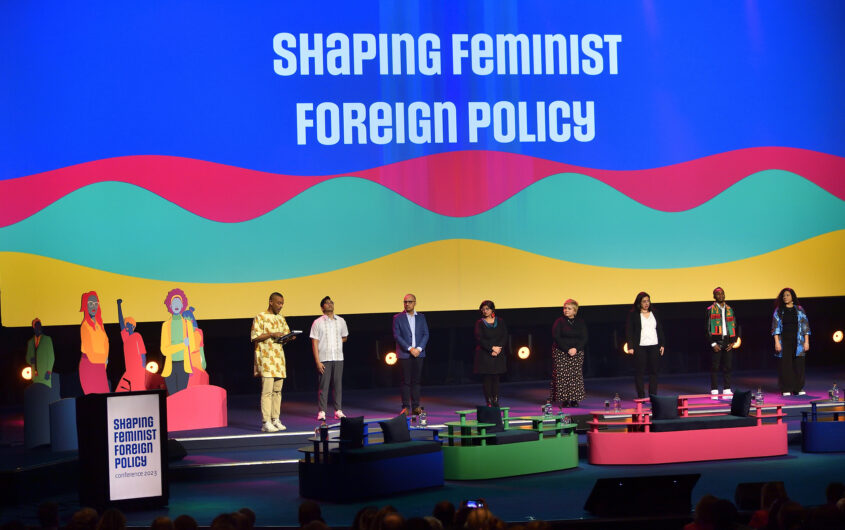
Ministerie van Buitenlandse Zaken via Flickr
The Pressure on Feminist Foreign Policy

Luisa Latella
Halle Foundation/AGI Intern
Luisa Latella is a research intern at AGI for the fall of 2023. She assists resident fellows with their research projects, manages databases, and helps organize and document events. Ms. Latella is an exchange student at American University as part of her bachelor’s degree in Political Science with a minor in Law at Ludwig-Maximilian-University in Munich. In her studies, she focuses particularly on international relations and the impact of power shifts in the international system on transatlantic relationships. At LMU, she works as a student assistant at the Chair of Global Governance and Public Policy researching international organizations and transatlantic relations.
About ten years ago, Sweden became the first country to officially commit to a so-called feminist foreign policy. Although Sweden’s center-right government, which took office in 2022, has abandoned the policy, the concept has attracted attention and been implemented in many countries. One of them is the Federal Republic of Germany, which adopted the concept in 2021 and even included it in its coalition agreement. The newly-elected German government could not foresee the uncertain and crisis-ridden times ahead. The response to the war in Ukraine came with the new concept of the Zeitenwende—a fundamental reorientation of German foreign policy. Many of the government’s policy decisions to respond to Russia’s aggression and a world characterized by competition and rivalry are argued to conflict with the transformative goals of a feminist foreign policy. Does this mean the feminist approach that Foreign Minister Annalena Baerbock has championed and Olaf Scholz has endorsed is on the verge of failure even before it has had a chance to be implemented?
Admittedly, the idea of a feminist foreign policy is not completely new in Germany. Then-Foreign Minister Heiko Maas (SPD) already tried in 2019 to connect foreign policy with gender equality, pledging “less patriarchy and more feminism,” an approach that was reflected when Germany co-hosted a high-level commitments event on Women, Peace, and Security before the anniversary of Security Council Resolution 1325. What changed in 2021 is the official designation of foreign policy as “feminist.” But what exactly does this mean?
There is no single definition for the concept of feminist foreign policy. The establishment and implementation of feminist foreign policy goals by different countries and governments has led to different approaches and priorities. In general, they share a focus on achieving gender equality, promoting peace, and respecting human rights. Sweden developed the so-called 3R approach—rights, representation, and resources—in formulating its feminist foreign policy concept. It aims to strengthen and secure women’s rights and representation by providing the necessary resources. The German approach is also based on this model, as the coalition agreement defines feminist foreign policy as the promotion of the rights, resources, and representation of women and girls and marginalized groups worldwide. This is explained in more detail in in the guidelines of the Federal Foreign Office, which are intended to guide foreign policy action.
Unfortunately, since the publication of the guidelines in March 2023, the German definition of feminist foreign policy has not gotten through to the public yet, as around 60 percent of Germans say they have never heard the term feminist foreign policy and do not know what it means. Even though a large part of society does not really know what a feminist foreign policy is, almost 60 percent of the citizens rate it negatively. Moreover, the word “feminist” itself seems to evoke a strong aversion in many citizens. The annual Leipzig Authoritarianism Study revealed a sharp rise in anti-feminism in Germany. More than 23 percent of respondents said that feminism disturbs social harmony, so it is no wonder that the new concept of the foreign ministry has not yet found much support among the citizens. But it is not only here that important support is lacking; there is also criticism of Annalena Baerbock’s concept within the political ranks. Friedrich Merz, leader of the conservative opposition Christian Democratic Union (CDU), made clear that he does not see feminist foreign policy as a priority: “You can do a feminist foreign policy, a feminist development policy—you can do all that. But not with the budget for the Bundeswehr.” But criticism has also come from the Liberal (FDP) coalition party, with deputy party leader Wolfgang Kubicki saying, “I don’t think much of the concept of feminist foreign policy because it is less aimed at achieving diplomatic improvements than at the emotional satisfaction of domestic political actors.”
While the introduction of such a far-reaching concept would already be a great challenge in times of peace, it is not surprising that the war in Ukraine represents yet another stress test for German feminist foreign policy. Since the beginning of the war, Germany, together with the other EU member states, has imposed various packages of sanctions against Russia. The aim of these sanctions is to make it more difficult to finance the war and to burden the political elite. Germany is making an important contribution to fighting the conflict by supporting these sanctions, but sanctions are viewed critically from a feminist perspective. Women and other marginalized groups suffer significantly more than the rest of society from sanctions; for example, their life expectancy decreases more than that of men because of sanctions. The arms deliveries to Ukraine have also drawn much criticism from the feminist spectrum. Classical feminist approaches not only want to achieve an absence of violence, but also actively campaign for disarmament and against militarization. This is why, among others, the well-known publisher of the German feminist newspaper Emma, activist Alice Schwarzer, wrote an open letter to Chancellor Scholz urging him to refrain from further deliveries of heavy weapons. Annalena Baerbock and the Foreign Office are more than aware of the dilemma posed by the arms deliveries and actions in Ukraine and therefore call for a combination of their principles with pragmatism. Germany’s guidelines state that its feminist foreign policy is not to be equated with pacifism but with a value-based approach that focuses on the security of people, which in some cases must also be protected militarily, distinguishing them from feminist approaches in political science calling for peace through demilitarization. It is therefore important to look at the actual strategy of German feminist foreign policy, because otherwise arms exports and sanctions are mistakenly seen as a contradiction to the declared feminist approach—which does not help to improve the already bad perception of Germany’s policy.
It is important that the Federal Foreign Office and the German government inform their citizens about the successes of feminist foreign policy to counteract critical and negative attitudes.
Although feminist foreign policy is currently facing several challenges, there are also positive developments in Germany and internationally.
In November 2023, the international conference on feminist foreign policy took place in The Hague, Netherlands. For two days, topics such as the funding of women’s rights organizations and feminist movements were discussed, as well as feminist solutions to current foreign policy issues. Over 750 participants from forty different countries attended the summit, almost twice as many participants compared to the first conference in 2021, initiated by the Center for Foreign Feminist Policy (CFFP). CFFP is a Berlin-based non-profit organization which was founded in 2016 and advocates for a feminist foreign policy, and one of the founders Kristina Lunz was also involved in drafting the official guidelines for the German feminist foreign policy. In addition, the CFFP plays an important role internationally, as the organization is trying to connect states, organizations, and activists around the globe.
This is not the only recent international success of feminist foreign policy. Together with other states committed to a feminist foreign policy, Germany is a member of the United Nations Feminist Foreign Policy Plus (FFP+) group. During the 78th session of the United Nations General Assembly in September, the FFP+ drafted a political declaration and, for the first time, set out six goals of a feminist foreign policy on a supranational level. This was an important and decisive step towards a more standardized definition of feminist goals, which will hopefully avoid many ambiguities and misinterpretations of the term in the future.
A look at the recently developed Feminist Foreign Policy Index (FFP index) of the International Center for Research on Women (ICRW) also shows that Germany’s feminist foreign policy performs very well despite all the difficulties; it ranks in the top ten countries for its integrated policy approach. The index evaluates forty-eight OECD member countries on seven key priority areas, including peace and militarization, gender equality, institutional commitments, climate, and others, through twenty-seven indicators. The ICRW’s Index is not intended to be a critique of existing FFP frameworks but rather serves as an accountability mechanism and cross-country comparison tool. From now on, countries can compare their performance and receive individual feedback on areas where they can optimize their feminist approaches—making it much easier to improve their foreign policy.
Even if the broad understanding of feminist foreign policy has not yet been widely accepted, the discourse in Germany has changed since the official announcement of the feminist goals in 2021. German Development Minister Sonja Schulze admits that there was a lot of consideration before the new label was announced, but also commented, “would we have discussed this different view of development and foreign policy so much without the definition as feminist policy? We’ve never gotten as much attention for certain projects as we do now.” Explaining foreign policy is never easy. But the more real-life examples there are, the easier it will be to grasp the new concept and make it accessible to citizens. Germany is providing the UN Human Rights Monitoring Mission in Ukraine with 1.5 million euros from 2022 to combat sexualized and gender-based violence; it is supporting the construction of shelters for women and marginalized groups in Afghanistan; and it is educating communities in Ethiopia, Sierra Leone, and Somalia about female genital mutilation—to name just a few of the projects that are part of Germany’s feminist foreign policy. It is therefore important that the Federal Foreign Office and the German government inform their citizens about these successes of feminist foreign policy to counteract critical and negative attitudes. New initiatives such as the parliamentary group on feminist foreign policy can also make an important contribution to this. Michelle Müntefering (SPD), Agnieszka Brugger (Greens), and Marie-Agnes Strack-Zimmermann (FDP) founded the working group to actively contribute to the implementation of the new approach. Moreover, Germany is one of the most influential countries with an official feminist foreign policy—setting an example that will likely soon be followed by many other countries. This makes it even more important to continue and not to proclaim the end of feminist foreign policy, because as Kristina Lunz says, “The future of foreign policy is feminist.”








